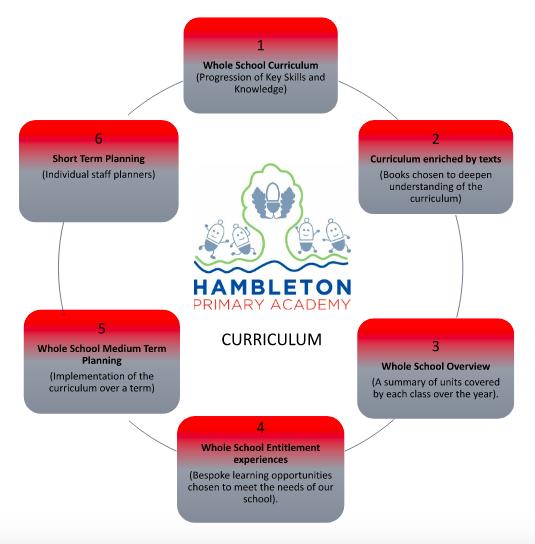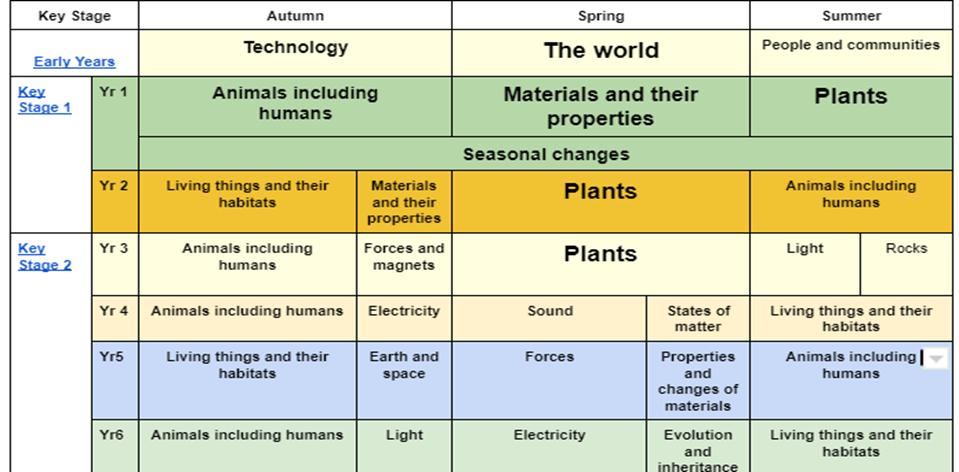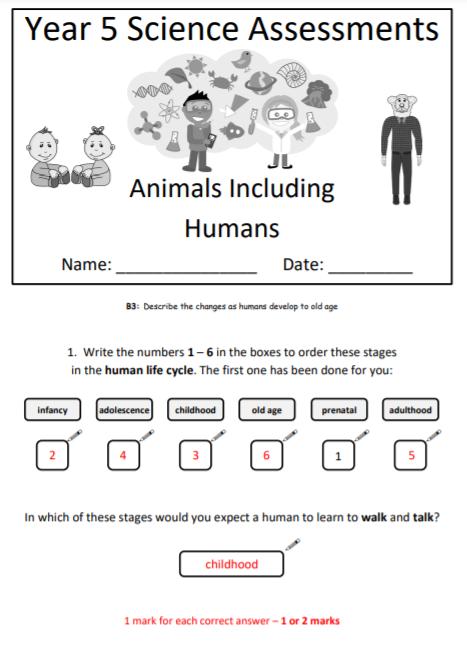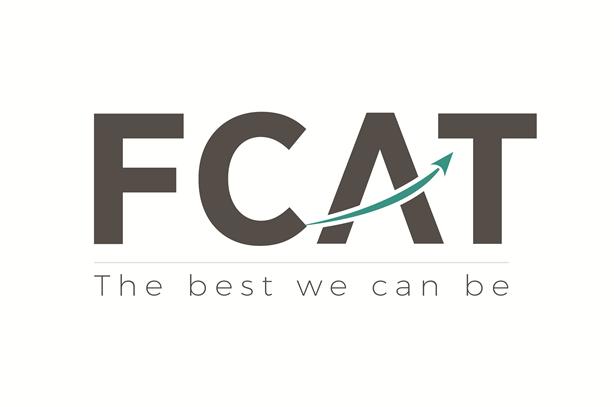 Progression of knowledge and skills
Progression of knowledge and skills
Subject implementation:
Hambleton Primary Academy seeks to provide an all round education for children in a bright, stimulating and fun atmosphere. Science at Hambleton aims to give all children a strong understanding of the world around them whilst acquiring specific skills and knowledge to help them to think scientifically, to gain an understanding of scientific processes and also an understanding of the uses and implications of Science, today and for the future. At Hambleton Primary Academy, scientific enquiry skills are embedded in each topic the children study and these topics are revisited and developed throughout their time at school. Topics, such as Plants, are taught in Key Stage One and studied again in further detail throughout Key Stage Two. This model allows children to build upon their prior knowledge and increases their enthusiasm for the topics whilst embedding this procedural knowledge into the long-term memory. All children are encouraged to develop and use a range of skills including observations, planning and investigations, as well as being encouraged to question the world around them and become independent learners in exploring possible answers for their scientific based questions. Specialist vocabulary for topics is taught and built up, and effective questioning to communicate ideas is encouraged. Concepts taught should be reinforced by focusing on the key features of scientific enquiry, so that pupils learn to use a variety of approaches to answer relevant scientific question
At Hambleton Primary Academy we have a clear vision for science. Our vision is for science to inspire children; encouraging them to be inquisitive about the world; it nurtures their innate curiosity and enables them to develop a range of skills that are useful across their learning both now and in their future lives. We think science is for everyone. Understanding science allows people to make informed decisions about new technologies, their health and other important matters. We champion science and make sure that every child has a positive experience of science throughout their time at Hambleton Primary Academy. This has been found in the multiple monitoring that has taken place the children are very positive when talking about Science . We believe inspiring science teaching arises from lessons that place scientific enquiry at the heart of our school’s science curriculum. It develops both scientific knowledge and conceptual understanding to a level where they can be used to understand the uses and implications of science, today and for the future.
Fundamental Great British Values:
At Hambleton Primary Academy, we understand our responsibility in preparing children for their next stage of education and for the opportunities, responsibilities and experiences of later life, laying the foundations so that they can take their place successfully in modern British society. Mutual Respect and Tolerance. We promote a respect for and understanding of different faiths, cultures and lifestyles through learning about scientists from around the world and the ways in which religion and science coexist. Focusing on Democracy, the children understand that we all have a role in influencing decisions, and everyone has a right to have their voices heard. We should be aware of our rights and responsibilities. Students work together practically in groups which encourages them to share views and opinions and take instructions from
others. There are opportunities to debate issues where students can share their opinions and listen to the views of others. Looking at how The Rule of Law can be recognised in our science lessons; Laws protect everyone and no-one is above the law. We should understand the need for rules to make a happy, safe and secure environment and know the consequences when rules are not followed. Students follow laboratory rules for the safety of all. Students learn about the need for speed limits and seat belts. There are opportunities to discuss laws relating to science, such as the use of IVF, genetic modification and DNA databases, use of energy sources, fishing and farming. Individual Liberty, we have a freedom of choice and a right to respectfully express our views and beliefs. We can act as we choose within the law. The rights of ourselves and the others around us are protected. There are opportunities for students to work independently and make choices in a safe environment when carrying out investigations. There are opportunities to debate issues where students can share their opinions and listen to the views of others. For example, the generation of electricity, the placement of building sites, the use of drugs, genetic modification, selective breeding and climate change.
Planning:
Science is taught through a topic approach based on the National Curriculum 2014 with working scientific skills following a progression approach which builds on skills taught in the previous year group and also with the transition into the next Key stage in mind. Our curriculum is carefully planned to engage and excite all of our learners; phase maps ensure that a range of topics are taught across the phases, with some topics adjusted across year groups in order to closely fit with other subjects and allow for a cross-curricular approach when possible.

Science and Sex Education:
Under the National Curriculum, the basics of Sex Education fall within the science curriculum. The statutory content requires maintained schools to teach children about human development, including puberty, and reproduction. Please see the DfE Science Programme of Study below which includes specific content for each year group.
In Key Stage 1, pupils will: Be introduced to the process of reproduction and growth in animals. They should be introduced to the concepts of reproduction and growth, but not how reproduction occurs.
Key Stage 2, pupils will:
Be taught about different types of reproduction, including sexual and asexual reproduction in plants and sexual reproduction in animals. Pupils should draw a timeline to indicate stages in the growth and development of humans. They should learn about the changes experienced in puberty.
EYFS
Science is an integral part of EYFS as the rationale is ‘stimulate and excite children’s curiosity about phenomena and events in the world around them and give them the knowledge that enables them to understand what is happening’. This sums up the EYFS curriculum. Specifically, ‘Understanding the world: The world’ relates to science. Children in EYFS are encouraged to share their experiences and knowledge at the start of any new ‘topic’. The EYFS classroom has been organised to encourage the children to take part in various activities linked to “Understanding the world” and staff in EYFS use a combination of pictures, quotes and work to gather evidence for our assessment. The EYFS teacher works closely with the Science lead to ensure they are aware of what Science looks like in EYFS and how this learning
Assessment:
Ongoing assessment and reviews are fundamental to Science teaching at Hambleton Primary Academy; teachers are constantly making judgements with regards to attainment and understanding in lessons and altering them accordingly. Feedback and marking of children’s work is guided by the Academy marking policy and lessons are planned following our Bronze, Silver and Gold objectives which promote challenge and support. Through conversations we seek to close gaps in understanding and ensure value added attainment – intervention for support and challenge is planned accordingly. Children are assessed formatively/summatively at the end of each topic (Using assessments created by the Fylde Coast Academy Trust) and this data is used to identify children who might need further support (within the class) and by the subject leader to identify any trends across particular areas of science which may require further CPD or particular groups of pupils that are struggling/excelling. Parents are informed of their child’s attainment and effort on a termly basis through parent consultation evenings.


Collecting evidence and Monitoring:
Whilst data gives a snapshot of attainment and progress, standards in Science at Hambleton Primary Academy are continuously monitored using a plethora of approaches and methods including: planning reviews, book scrutiny, teacher discussions, pupil interviews , science leader discussions and evidence collecting. The subject leader works closely with other subject leaders throughout the Academy and takes part in regular quality improvement groups (QIG’s). The subject leader also communicates with the trust’s head of science who will regularly visit and accompany the subject leader on their half termly monitoring. This gives them the opportunity to observe science teaching in the classroom and can talk to the children.
Able, Gifted and Talented Pupils:
The key skills and knowledge needed for each year group are stated in the end of year group expectations and pupils are assessed against these. Children who are identified as more able in science are challenged within the lesson in terms of deepening their understanding of a topic and being encouraged to both read around the subject and explain their findings in more scientific detail. Families are signposted to
science days/events run by outside agencies and visits from scientists within the Academy community increase science capital and increase understanding of the importance of science outside of Academy.
SEND and PP Pupils
At our school we teach Science to all children, whatever their ability. It is part of the school curriculum policy to provide a broad and balanced education to all children. We provide learning opportunities that are matched to the needs of children with learning difficulties. Work in Science takes into account the targets set for individual children in their Personal Plans (PPs) and caters for their specific needs.. We have experienced TA’s who are trained to take out intervention groups which may include SEND children. This will provide children with the opportunity to develop their Science knowledge and skills through a more guided teaching sequence. In Science, children will be given more scaffolding, explanation of key vocabulary and scientific concepts. Teachers at Hambleton when planning Science consider a multi sensory approach when it comes to their teaching and learning of Science to enable all children to be able to make progress in each of their lessons.
Enrichment opportunities
It is hoped that these will all resume this year as, with the exception of the travelling science show, it was not possible for these to take place the last two years.
Enrichment
Further Information
Science Author Talk Konnie Huck read parts of her book for a group of children across FCAT. Children were given the opportunity to purchase the book and also talk to Konnie about her journey as a scientist.
Sciathon Final Key Stage 2 children were invited to a “Sciathon”. This is where all the various FCAT schools gathered to compete in various scientific questions and investigations against each other for points and prizes.
FCAT Science Awards Gifted and talented pupils were selected for their scientific abilities and celebrated with staff and family for their achievements throughout the year.
Blackpool Sixth FormScience Pupils from Year 5 & 6 were invited to take part in a day full of Science, children had to work together to solve various problems, answer difficult questions and complete experiments.
Year 7 transition Year 6 pupils were visited by a high school Science teacher to take part in Biology/Chemistry and Physics lessons.
VR Headsets Children were given the opportunity to explore space and galaxies with the use of virtual headsets.
Targets:
Ensure all aspects of science are being covered to ensure all working scientific skills are being covered.
Allow children to be exposed to varied working scientific skills across the year.
Develop understanding of knowledge and skills.
Assist teachers with understanding of working scientific skills with GDS children.
Cover all objectives for science and working scientifically from the NC.
Be recognised for Scientific achievements throughout the school
Promote science/STEM across whole school
Celebrate achievements
Make science purposeful and engaging.
Staff training:
Met with the new Science Lead for the Trust. Discussed what we would like in place for the Year ahead.
We are hoping that practical opportunities, such as dissections and using proper labs from the high school will happen.
First Science book scrutiny completed.
All monitoring completed. TP is to take over Science
Feedback from Annie regarding Science monitoring completed
It is easier to see where we currently are with Science. It’s great to see some fantastic work. This will enable consistency in marking.
Subject handover to be completed with new Science leader.
We are clear on the strengths of Science and where we can make it better through supporting staff and ensuring consistency in our approach to teaching Science
Attended QIG with FCAT science leader
TP to book onto training and feedback to staff. Discussion with MG about Action Plan and monitoring feedback as completed above.
TP to organise the next monitoring day and focus as per the action plan.
All monitoring completed and whole school feedback completed.
TP to add BW/AS/GL/AR to the FCAT science drive and all staff to implement new changes.
TP emailed SW to add new staff to FCAT science drive.
All staff added to the FCAT drive and given CPD on how to use it and access planning/resources
TP booked on Phizzi Forces training on the 22/11/21
Arrange a meeting with SW to introduce myself and the school and showcase some of the work we have been doing.
TP emailed SW to arrange meeting for the 17/11/21
Prepare a selection of books and work to show SW.
TP met with SW to talk about how she can support the school going further and help with planning, teaching and assessment.
SW to work with the QIG to produce electronic assessment which can be completed and analysed via google forms.
TP attended Phizzi Forces training with the Ogden trust. TP was given a resource back and an equipment box was ordered.
TP to feedback to Year 3 and Year 4 to discuss what they are doing next term and how the CPD TP attended can help their teaching and learning.
TP showed staff the equipment box and discussed how they could use this next term to help teach their topics.
TP went to watch AR teach a lesson in Nursery about magnets and forces.
TP explained to all staff that if they need any more training with the boxes that they can arrange to come and have an open conversation with them.
TP watched the teaching and learning of science within a nursery setting and also discussed next steps for them and how this leads into transitioning into EYFS
TP and SW (FCAT Science lead) did a walk round of the whole school YR-Y6 while they were teaching science. TP/SW spoke with children, looked at books and also watched lessons which were being taught that day.
TP gained a better understanding of what science is looking like across the whole school. SW identified the level of vocabulary being articulated when discussing science with the children was extremely high.
TP feedback to AR about the monitoring that took place with SW. TP discussed with AR the strengths and the areas of improvement from the monitoring.

2023-2025
Science at FCAT is underpinned by our three guiding principles
• Children come first and are at the heart of all we do.
• Positive relationships underpin all our work.
• High expectations everyone can achieve.
Science is a subject that allows students to understand the world around them. At FCAT we aim to foster students' interest and enthusiasm for science, whilst providing the best learning environment, delivering the best possible provision that meets the needs of all of our learners and achieving the best possible outcomes for our young people.
Curriculum
Science is a core subject in the National curriculum. Our curriculum covers the National curriculum in full.
The science curriculum from EYFS to KS4 has been carefully planned and sequenced to ensure that students secure and can connect key substantive and disciplinary knowledge at all stages of their schooling. The knowledge students learn builds as students move through year groups and key stages. Regular opportunities for purposeful practical work are planned into the curriculum.
Learners are offered extra curricular opportunities to extend their learning beyond the curriculum.
Health and Safety
All learners will be taught to work safely with scientific equipment and materials.
Each school within the Trust is responsible for teaching science in a safe environment and complying with health and safety guidelines including all risk assessments associated with science curriculum and activities.
At secondary level, heads of department shall ensure that a Health and safety policy at each site is developed and maintained documenting the arrangements that are in place within the department. (See FCAT H&S policy).
Professional Development
FCAT has a commitment to supporting all staff to be the best version of themselves. Regular high quality subject specific professional development is offered to colleagues via the most appropriate source, be this internal or external.
Collaboration is one of FCATs core values. Departments and colleagues are encouraged to work together within the trust, with other subject departments and to be involved with professional subject networks and associations.
